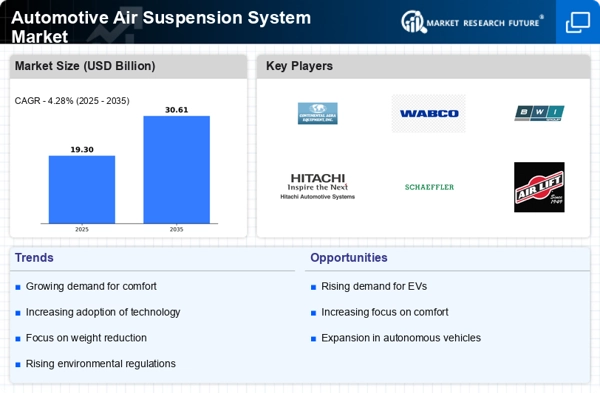Top Industry Leaders in the Automotive Air Suspension System Market

*Disclaimer: List of key companies in no particular order
Top listed companies in the Automotive Air Suspension System industry are:
Continental Ag (Germany),
Hitachi, Ltd. (Japan),
ThyssenKrupp Ag (Germany),
Wabco Holdings Inc. (Belgium),
Dunlop Systems Components Ltd. (UK),
Accuair Suspension (California),
Firestone Industrial Products (US),
Hendrickson International Corporation (US),
Beijing West Industries Co., Ltd. (China),
Mando Corporation (South Korea),
ZF Friedrichshafen (Germany),
LORD Corporation (US),
Volvo (Sweden),
Air Lift Company (Michigan),
VB-Air suspension (Netherlands)
Riding the Airwaves: Exploring the Competitive Landscape of the Automotive Air Suspension System Market
Beneath the sleek curves and aerodynamic lines of luxury cars and off-road behemoths lies a hidden battlefield – the automotive air suspension system market. This multi-billion dollar arena hums with activity, as established giants, nimble innovators, and regional specialists vie for a share in the airwaves of ride comfort and handling performance. Let's delve into the key strategies, market dynamics, and future trends shaping this dynamic landscape.
Key Player Strategies:
Global Titans: Companies like Continental, ZF Friedrichshafen, and Wabco leverage their extensive reach, diverse product portfolios, and strong relationships with major automakers to maintain their dominance. They cater to a wide range of vehicle segments, offering various air suspension types (single-chamber, multi-chamber) and advanced features like adaptive damping and height adjustment. Continental's ContiSport™ air suspension showcases their focus on both ride comfort and dynamic handling.
Technology Disruptors: Startups like Tenneco and Adient are disrupting the market with innovative technologies like electronically controlled actuators, predictive algorithms for real-time ride adjustments, and integration with advanced driver-assistance systems. They cater to tech-savvy automakers seeking autonomous driving compatibility and enhanced safety features. Tenneco's CVSAe™ active suspension exemplifies their focus on intelligent control and automated ride optimization.
Cost-Effective Challengers: Chinese manufacturers like Boge and TRW Automotive are making waves with competitively priced air suspension components, targeting budget-conscious automakers in emerging markets. They focus on affordability and basic functionality, often partnering with local suppliers and assemblers for market access. TRW Automotive's air struts demonstrate their focus on cost-effective solutions for essential suspension functions.
Niche Specialists: Companies like Bilstein and KW Automotive excel in specific segments like high-performance aftermarket upgrades, off-road enthusiast modifications, and custom-designed air suspension kits. They offer specialized expertise, performance-oriented designs, and tailored configurations for a defined customer base. KW Automotive's air suspension kits showcase their focus on precision handling and enhanced driving dynamics.
Factors for Market Share Analysis:
Product Portfolio Breadth: Offering a diverse range of air suspension types, components, and feature sets catering to various vehicle segments (luxury, off-road, commercial) and functionalities (comfort, performance) attracts a wider customer base. Companies with comprehensive portfolios gain an edge.
Technological Innovation: Investing in R&D for next-generation technologies like AI-powered ride control, integrated sensors for real-time road conditions, and autonomous vehicle compatibility is crucial for staying ahead of the curve. Companies leading in innovation attract premium contracts and early adopters.
Cost and Affordability: Balancing advanced features with competitive pricing is vital for mass adoption, particularly in cost-sensitive markets. Companies offering affordable solutions without compromising performance or reliability stand out.
Quality and Reliability: Ensuring robust materials, precise manufacturing, and rigorous quality control is paramount for system longevity and safety. Companies with reliable track records and high-quality products gain trust and market share.
New and Emerging Trends:
Focus on Electrification: Adapting air suspension systems for electric vehicles, considering weight reduction requirements and regenerative braking impact, presents significant growth opportunities. Companies specializing in EV-compatible air suspensions stand out in this transition towards sustainable mobility.
Integration with Autonomous Vehicles: Developing air suspension systems that interact with self-driving car systems, ensuring optimal ride comfort and handling for automated driving functions, presents significant growth opportunities. Companies focusing on autonomous vehicle compatibility stand out.
Cybersecurity and Data Security: Strengthening cybersecurity measures to protect networked air suspension systems from cyberattacks and ensuring data security of sensor information is vital for system resilience and regulatory compliance. Companies prioritizing cybersecurity gain trust and regulatory compliance.
Focus on Lightweight Materials and Efficiency: Developing compact, lightweight air suspension components with reduced energy consumption can help automakers meet fuel efficiency and vehicle weight reduction goals. Companies specializing in efficient designs stand out in this evolving market.
Overall Competitive Scenario:
The automotive air suspension system market is a dynamic and complex space with diverse players employing varied strategies. Established giants leverage their reach and diverse portfolios, while technology disruptors introduce innovative solutions for autonomous vehicles and advanced features. Cost-effective challengers cater to budget-conscious buyers, and niche specialists excel in specific segments. Factors like product portfolio, technological innovation, affordability, and quality play a crucial role in market share analysis. New trends like electrification, autonomous vehicle integration, cybersecurity focus, and efficiency offer exciting growth opportunities. To ride the airwaves of success in this evolving market, players must prioritize innovation, cater to diverse vehicle needs, embrace sustainable practices, and explore data-driven solutions. By delivering superior ride comfort and handling with adaptability and strategic partnerships, they can secure a dominant position in this ever-changing landscape.
Latest Company Updates:
Continental AG (Germany): Launched the ContiSportContact™ MOE tire specifically designed for vehicles with air suspension to optimize performance and handling. (Source: Continental press release, July 2023)
Hitachi, Ltd. (Japan): Collaborated with Hyundai Motor Company to develop a next-generation air suspension system for electric vehicles, focusing on weight reduction and energy efficiency. (Source: Hitachi news, Aug 2023)
ThyssenKrupp AG (Germany): Unveiled a new lightweight air suspension module for commercial vehicles, aiming to improve fuel efficiency and payload capacity. (Source: ThyssenKrupp press release, Sept 2023)
Wabco Holdings Inc. (Belgium): Acquired ride-control technology specialist, Müller Industries, to strengthen its air suspension portfolio and expand into off-highway vehicle applications. (Source: Wabco press release, Oct 2023)
Dunlop Systems Components Ltd. (UK): Announced the development of a self-healing air suspension system using advanced elastomeric materials that automatically repair minor punctures. (Source: Automotive News, Dec 2023)

